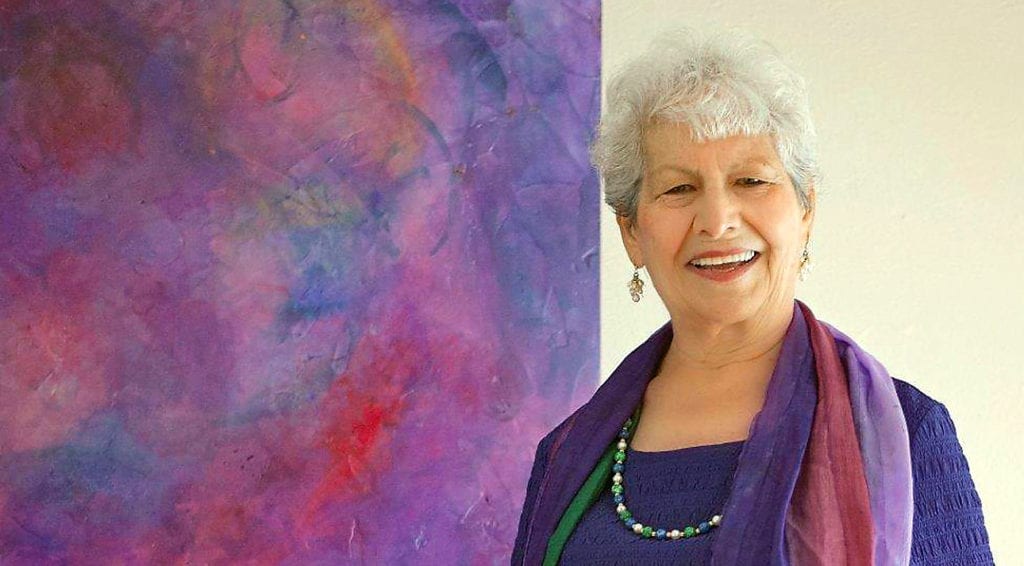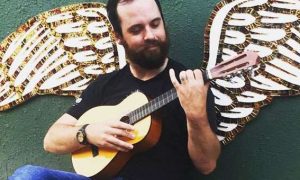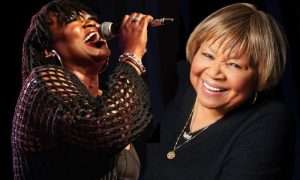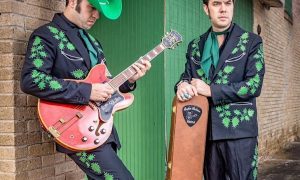“There is only one corner of the universe you can be certain of improving, and that’s your own self.” – Aldous Huxley author of “Brave New World”
By Derrick White
“Where there is peace, there is culture; where there is culture, there is peace.” – Nicholas Roerich.
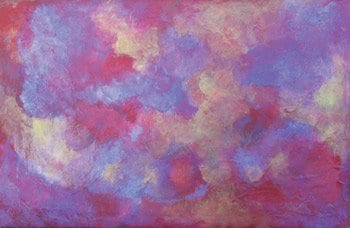 I believe people come into your life for a reason and one of the biggest blessings of being an educator is how many lives cross paths with my own. I was privileged enough to meet and befriend a Tyler Junior College student a few years ago and I have to say, if more people on this seemingly imploding planet were more like Ruth, things would be a lot better. Take my word for it. Local east Texas artist, author, numerologist and peace advocate Ruth Drayer has a warm, positive personality, an inner glow, and an eclectic background built from life experiences not formal education. She always knew she was an artist even though her early home life was, in her words, a battlefield and wasn’t conducive to creativity. She says she spent most of her early childhood hiding. When Ruth began college in Washington, DC, where she had grown up, she intended to teach art but instead she quit school and married a sailor whose life happen to cross her path. By the time her husband was discharged from the Navy and enrolled in medical school, Ruth was working full-time and was the mother of two children. Still she continued artistic pursuits and worked to brighten their home with color.
I believe people come into your life for a reason and one of the biggest blessings of being an educator is how many lives cross paths with my own. I was privileged enough to meet and befriend a Tyler Junior College student a few years ago and I have to say, if more people on this seemingly imploding planet were more like Ruth, things would be a lot better. Take my word for it. Local east Texas artist, author, numerologist and peace advocate Ruth Drayer has a warm, positive personality, an inner glow, and an eclectic background built from life experiences not formal education. She always knew she was an artist even though her early home life was, in her words, a battlefield and wasn’t conducive to creativity. She says she spent most of her early childhood hiding. When Ruth began college in Washington, DC, where she had grown up, she intended to teach art but instead she quit school and married a sailor whose life happen to cross her path. By the time her husband was discharged from the Navy and enrolled in medical school, Ruth was working full-time and was the mother of two children. Still she continued artistic pursuits and worked to brighten their home with color.
Years later, with four kids and a husband starting his private medical practice, Ruth took a local Continuing Education ceramics class and learned to work in clay. Ruth enrolled at the University of Texas at El Paso and took several art classes, and that’s when the magic happened. Unfortunately, then came turmoil. Ruth’s family experienced divorce. “I had to go to work in a florist shop and was trained to do weddings, and I learned the rules of design and discovered I had a natural gift for color,” states Ruth. She remembers, “My life became very hectic after my divorce.”
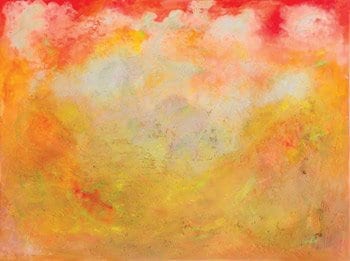 “As you simplify your life, the laws of the universe will be simpler; solitude will not be solitude, poverty will not be poverty, nor weakness, weakness.” – Henry David Thoreau.
“As you simplify your life, the laws of the universe will be simpler; solitude will not be solitude, poverty will not be poverty, nor weakness, weakness.” – Henry David Thoreau.
Later, living in Santa Fe, New Mexico, Ruth owned an art gallery, managed another gallery, wood-burned designs on sheepskin coats, studied interior design, created rock gardens, and then traveled to Europe. “In Italy, I saw the great value of knowing art history as I recognized so many things I’d studied. I went to many museums, churches, and galleries throughout Europe, and by the time I got to see some of the work of the French Impressionists, I understood the controversy they had created with their brush strokes visible all over their canvases instead of the exact, precise, smooth brush strokes of earlier painters. I then studied color healing, color theory, and read everything I could find on color,” says Drayer.
It was in Italy Ruth realized she could put up with any inconvenience if there was beauty around. “This idea drew me to the work of the Russian visionary artist Nicholas Roerich, who believed beauty speaks an international, global language. If people were educated to the importance of art, we could all live in a world of peace. He was called a master of color and during the next 15 years I researched and wrote his biography, ‘Nicholas & Helena Roerich, the Spiritual Journey of Two Great Artists & Peacemakers.’ I saw many of his 7,000 pieces. It was his use of color that fascinated and inspired me most,” asserts Ruth. Nicholas Roerich established the peace pact, an international agreement allowing any nation to protect its cultural or artistic heritage with a symbolic banner, the Banner of Peace. The pact states, “Educational, artistic, and scientific institutions shall be protected and respected by belligerents without any discrimination. Thus, any site of cultural activity around the world can fly the Banner of Peace to declare neutrality, independent of combatant forces, and protected by international treaty.”
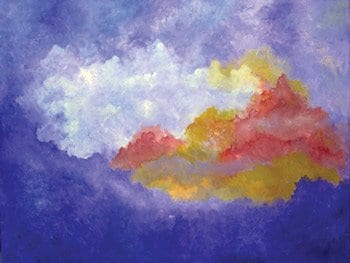 After writing and publishing a book on the Roerichs, Ruth began to find peace and tranquility in painting. She was drawn to non-representational art. “I wanted permission to paint without knowing what I was doing,” she says. Ruth adds, “It’s all a voyage of discovery, just like life.”
After writing and publishing a book on the Roerichs, Ruth began to find peace and tranquility in painting. She was drawn to non-representational art. “I wanted permission to paint without knowing what I was doing,” she says. Ruth adds, “It’s all a voyage of discovery, just like life.”
Ruth Drayer works in acrylics and builds up layers on the surface of the canvas. She uses texture to add extra elements then paints a spiritual symbol or word like love, peace, harmony, etc. which then gets masked and hidden. “Painting has opened another world for me. My art allows me into dimensions I’d never reach in any other way. I’m still fascinated with color, and I get very involved with each brush stroke and how it interacts with the one next to it. It has been so fascinating to see how much my work grows with a life of its own. I see my earlier work and wonder how I did it and wish I could do more, but I’ve never been able to reproduce anything I’ve already completed,” states the artist.
Artists who influence Drayer include Stanton McDonald Wright (American, early abstract painter), Nicholas Roerich (the aforementioned Russian painter, writer, archaeologist, theosophist), Wassily Kandinsky (Russian painter, art theorist and groundbreaker in purely non-representational painting), and Marc Chagall (Russian-French artist and modernist known for his color and dreamlike images).
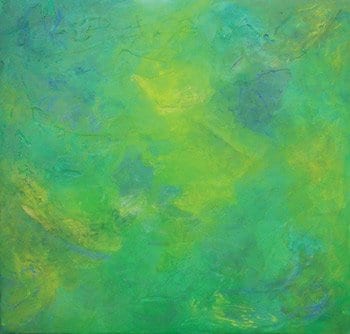 “I’d say the most important advice I could give is to paint and create for you. When I began, I called my works ‘no thing’ (no object) paintings and I was embarrassed about what people would say when they saw them, and I shared them with very few. But when I had 12 completed, I had my first art show. My favorite compliment was from an artist friend who said I painted ‘nothing’ better than anyone she’d ever seen,” beams Ruth Drayer, artist and peacemaker.
“I’d say the most important advice I could give is to paint and create for you. When I began, I called my works ‘no thing’ (no object) paintings and I was embarrassed about what people would say when they saw them, and I shared them with very few. But when I had 12 completed, I had my first art show. My favorite compliment was from an artist friend who said I painted ‘nothing’ better than anyone she’d ever seen,” beams Ruth Drayer, artist and peacemaker.
Check out this artist of visions and dreams at www.ruthdrayer.com or find her on Facebook while you still can before she moves back to New Mexico to paint, live, dream, and receive love and support from her community.
“He who lives in harmony with himself lives in harmony with the universe.” – Marcus Aurelius.
* Obviously a borrowed title.
Peace out!
.


